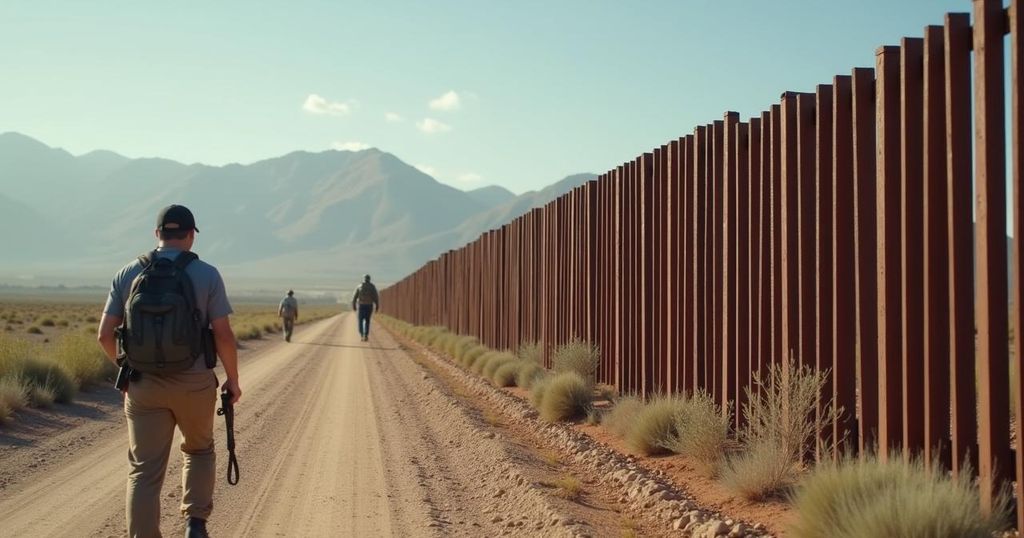As U.S. Election Approaches, Mexico Steps Up Border Enforcement to Block Migrants
In the context of the upcoming U.S. presidential election, Mexico’s border enforcement has intensified, resulting in a substantial reduction in migrant crossings. This shift is attributed to a strategic agreement with the Biden administration, aimed at maintaining economic stability and preventing political fallout from immigration issues. Despite increased enforcement, the situation remains complex for migrants testing their limits to cross into the United States.
As the United States presidential election approaches, Mexico has intensified its border enforcement efforts, leading to a notable decrease in migrant crossings to the U.S. Analysts attribute this decline to a strategic, albeit unwritten, agreement between Mexico and the Biden-Harris administration aimed at curbing illegal crossings. This partnership has become critical for Mexico, whose economy and political landscape stand to be influenced by U.S. voter sentiments regarding immigration. Illegal crossings have become a pivotal issue in the election campaigns of both major parties, with President Donald Trump leveraging them for Republican support, while Vice President Kamala Harris faces challenges in addressing the same. Mexico’s President Claudia Sheinbaum is cognizant of the implications of migrant flows on the electoral process and is taking measures to maintain border stability prior to the election. Data reveals a drastic decrease in migrant encounters at the U.S. border, dropping from nearly 250,000 in December to below 60,000 recently, the smallest monthly sum since the previously held Trump administration. During this same timeframe, the number of migrant apprehensions has surged across Mexico, indicating a complex interplay between enforcement within Mexico and the dynamics at the border. The shift in policy, instigated by discussions between President Biden and the Mexican President, highlights Mexico’s proactive stance in mitigating migration-related challenges. Following urgent negotiations, Mexico enacted stringent measures including increased immigration enforcement, imposing visa requirements, and ramping up deportations. These policies have significant consequences for migrants attempting to transit through the country, exemplified by the experiences of families like that of Mari Eduvid Sarmiento and Samuel Malave Sarmiento, who find themselves trapped in the capital amid stricter controls. Former ambassador Arturo Sarukhán asserts that Mexico has effectively ‘weaponized’ migration, turning what should be a cooperative humanitarian endeavor into a matter of political leverage, while Andrew Selee of the Migration Policy Institute notes the lack of formal agreements between the two governments, emphasizing that their cooperation often unfolds through informal understandings. Ultimately, whether Mexico will sustain its current enforcement regime under Sheinbaum’s administration remains uncertain; however, she has expressed commitment to managing migration flows, recognizing their potential impact on the electoral process.
The current discourse surrounding U.S.-Mexico relations and border enforcement has escalated as the U.S. approaches its presidential election. The historical complexity of migration issues has gained renewed significance, given the potential consequences for political parties and the public’s perception of immigration. The Biden administration’s need to control migrant flows in the lead-up to the elections has prompted Mexico to adopt a more stringent approach towards border enforcement, highlighting the intertwined nature of migration issues and political considerations in both nations. In December 2023, following a surge of undocumented migrants reaching U.S. territory, urgent negotiations took place between the U.S. and Mexico, leading to Mexico’s intensified efforts to curb illegal crossings. This partnership reflects mutual interests, particularly for Mexico, as the implications of U.S. immigration policies can directly affect its economy and domestic stability.
In conclusion, as the U.S. elections draw near, Mexico’s strategic border enforcement has resulted in a significant reduction of migrant crossings, driven by economic and political imperatives. This cooperation highlights the delicate balance of power and responsibility in managing migration, raising critical questions about humanitarian obligations and the treatment of vulnerable populations. As the situation evolves, the political ramifications for both Mexico and the United States remain to be fully realized.
Original Source: www.usatoday.com




Post Comment